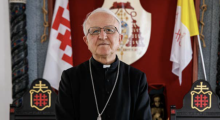Issued by the Catholic Center for Studies and Media - Jordan. Editor-in-chief Fr. Rif'at Bader - موقع أبونا abouna.org

Following is the text of the meditation by His Beatitude Cardinal Pierbattista Pizzaballa, Latin Patriarch of Jerusalem, on the 29th Sunday of Ordinary time, dated October 19, 2025:
As we listen to today’s Gospel passage, (Luke 18:1-8) we notice a striking contrast between the two main characters in the parable Jesus tells his disciples.
First, there is a judge described as someone who does not fear God and has no respect for anyone. (Luke 18:2) He is a man of power who uses his authority arbitrarily, corruptly, and dishonestly (“Listen to what the dishonest judge says,” (Luke 18:6) heartless and incapable of compassion.
Opposite him is a widow. (Luke18:3) Unlike the judge, the widow is powerless, unsupported, and has no one to help her secure her rights. She is the symbol par excellence of the poor and forgotten, whose rights are easily trampled.
The paradox of the parable is that this poor woman emerges victorious from the conflict. Everything suggests that the heartless judge will never help her, that she will always be defeated; but this is not the case. Even the judge, who seems unassailable, has a weak point, and the woman is able to find it, take advantage of it, and finally obtain the justice she deserves. The widow does not give up until this happens.
In his parable, Jesus wants to emphasize the figure of the widow rather than that of the judge. The judge serves only to highlight the widow.
Leaving the parable, Jesus immediately clarifies that the Father, to whom we address all our prayers, is not like this judge, but rather the exact opposite: “Will not God then secure the rights of his chosen ones who call out to him day and night? Will he be slow to answer them? I tell you, he will see to it that justice is done for them speedily.” (Luke18:7-8)
Prayer, then, does not consist in trying to convince God, as if he were a reluctant judge or an enemy to be won over. Prayer is believing that evil, like the dishonest judge, has a weak point, is destined to succumb, and is not eternal. The weak point of evil is time.
We see this in the words of the judge himself, who decides to do justice for the widow so she will not keep bothering him. (Luke 18:5) Evil has no patience, does not endure in the long term, and cannot withstand the passage of time. It is in a hurry and incapable of waiting; it exhausts itself and cannot last.
The widow, on the other hand, has nothing but time. She knows how to wait and lives according to the logic of the Kingdom, which grows and matures slowly and knows how to wait. She waits for the moment when God will promptly do justice (“I tell you, he will see to it that justice is done for them speedily.” (Luke 18:8)
Let us reflect on two terms in this last sentence.
The first is “do justice”. For God, doing justice does not mean solving problems, punishing the wicked, or giving everyone their due. For God, doing justice means saving, and saving everyone, by allowing goodness to mature until it can flourish and bear fruit for all.
The second is the adverb “speedily” which does not mean immediately. Rather, it means “at the right time”, and has nothing to do with the haste that evil demands. Evil’s haste is destructive, while God’s time is that of faith - silent and tenacious, with memory and perseverance.
God is an ally of time: he gives it to the poor and lives it with them, sustaining their waiting with a promise that speaks of his prompt presence in their history.
And humanity, for its part, is called to pray always (“he told them a parable about the necessity for them to pray always without becoming weary”. (Luke 18:1) This does not mean praying a lot, but always, with a faith that is not a momentary impulse but the slow maturation of God’s life in us.
This is the faith the Lord wants to find when he returns: “But when the Son of Man comes, will he find faith on earth?” (Luke 18:8)
+ Pierbattista







